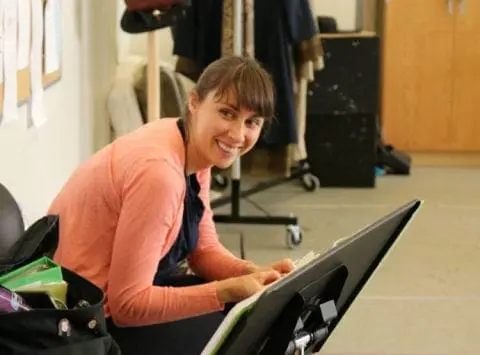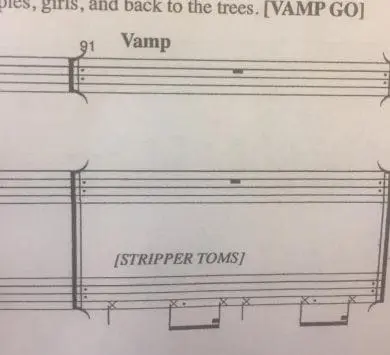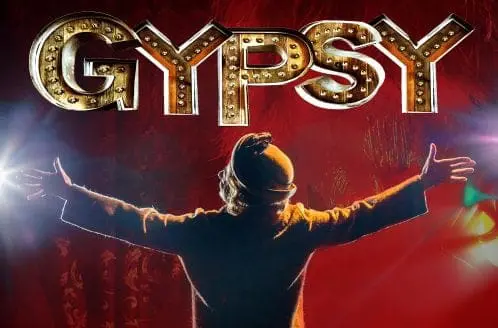Revealing: Caroline Dooner on Acting, Body Image & Burlesque
Caroline Dooner plays Louise in Gypsy.
Caroline Dooner returns to the Arden to play Louise in Gypsy this May 18- June 18. In this interview, Caroline speaks candidly on her acting career, body image, and introduction to burlesque.
Your website says, “Every few years, I tell myself I am quitting acting so I can focus on eating and sleeping and making money. And then I regret it and I un-quit and start the cycle all over again.” What always brings you back to acting?
What brings me back to acting is that I love it. I love getting to tell good stories through complex characters and good musicals.
What I don’t love as much, is the business side of it. I lived in New York for ten years, and up there I really was exhausted by the auditions, being my own agent or working with agents who don’t know or care about you, working so hard to get in the room, and the competition. Philadelphia has always been so welcoming to me. I’ve been very lucky here.
Do you relate to Louise as an actress? How has your journey been similar or different?

Caroline in rehearsal.
Well, I wasn’t a child actor forced into boys clothes and a cow head, and constantly neglected in favor of my more talented sister. And no stripping – (until now). But, I do completely understand the exhaustion with performing and wondering if it’s all really worth it. Performing is such a special, magical, and joyful thing, but it is also a strange grueling, scrutinizing, vulnerable thing. As a child I probably felt more like June – I was a good singer so I was always expected to perform – and I both loved it and hated it – sometimes wanted to just be left alone with a bag of chips.
However, whenever I seemed particularly tired or stressed, my mom would tell me I should just go into nursing – which Mama Rose would never, ever do. So I guess ultimately, I liked audition nerves more than needles.
What I do relate to in Louise, was eventually finding some autonomy and success in my own creations/writing and comedy. Which is what Louise did as Gypsy Rose Lee: humor and a little shock (The F*** it Diet, anyone???). If you read her autobiography that this musical is based on- it’s really dry and funny.
What is your favorite scene to perform and why?
My favorite scene is the one near the end leading up to the strip, where I have no lines. It’s the character’s terror, leading straight into a big musical montage which spans a few years, ending with a really empowered, practically different person than the one who started the montage. It’s fun to do and hopefully fun to watch? (I didn’t give anything away did I? We all know it’s a musical about a famous burlesque star, right??

You run a website called “The F*** It Diet.” Tell us about that.
5 years ago I dramatically declared to my parents that I was quitting theatre, and that I was diagnosing myself with disordered eating and body dysmorphia. I had been really obsessed with weight and food for years, and I wanted to heal that. And I knew I couldn’t do that while auditioning/acting. Plus I needed to know whether I cared about acting enough. I had always been on this acting train. I knew I liked doing it, but I never really chose it, so was curious if I would choose it when I had enough space from it.
At the same time I started writing about disordered eating and our cultural weight obsession over on The F**** It Diet. It grew and grew and became something I never thought it would be. I have some pretty strong and radical beliefs about how our society looks at weight and fears fat, and our misguided way of connecting weight and health.
Since you’ve written about body image before, what are your thoughts about body image in Gypsy, particularly in the world of burlesque?
This show and weight: It’s  really interesting, this show does not address weight. It really never talks about it, which is kind of an amazing and rare thing. It was written in the 50s, sort of right before our cultural obsession with twiggy skinny, so that might be part of it. And on a related note, it’s kind of hard to wrap my head around whether this play is feminist or not. On the one hand, it’s a show about women. It passes the Bechdel test over and over – women talking about things other than men. But in the empowerment of Louise comes from stripping. Is the way Gypsy Rose Lee did it empowering? Partly yes and partly no. She was forced into it, and is playing out a male fantasy. At the same time, it is her humor and ingenuity that made her a huge star: her own jokes and her own costume designs, which allowed her to be very much in control of her own life. The complexity of female empowerment in this play is fascinating and absolutely true to life.
really interesting, this show does not address weight. It really never talks about it, which is kind of an amazing and rare thing. It was written in the 50s, sort of right before our cultural obsession with twiggy skinny, so that might be part of it. And on a related note, it’s kind of hard to wrap my head around whether this play is feminist or not. On the one hand, it’s a show about women. It passes the Bechdel test over and over – women talking about things other than men. But in the empowerment of Louise comes from stripping. Is the way Gypsy Rose Lee did it empowering? Partly yes and partly no. She was forced into it, and is playing out a male fantasy. At the same time, it is her humor and ingenuity that made her a huge star: her own jokes and her own costume designs, which allowed her to be very much in control of her own life. The complexity of female empowerment in this play is fascinating and absolutely true to life.

Gypsy
A Musical Fable
Book by Arthur Laurents
Music by Jule Styne
Lyrics by Stephen Sondheim
Suggested by memoirs of Gypsy Rose Lee
On the F. Otto Haas Stage
May 18 – June 18, 2017
